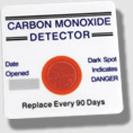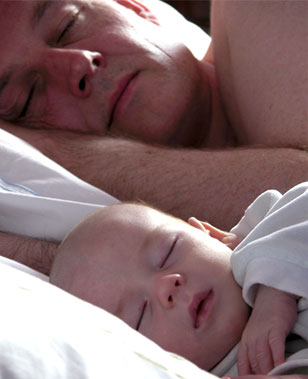 |
|
Color-Metric Carbon Monoxide Detector - Spot Type.
Detector badge is square
55 x 55 mm. |
C A R B O N M O N O X I D E
COLORLESS, ODORLESS and DEADLY.
A SILENT KILLER
You probably already know…
That within just a few minutes, you can collapse and die of carbon monoxide (CO) poisoning if exposed to heavy doses.
But did you also know…
- Severe heart and brain damage can result
from exposure to non-fatal levels of CO.
- Pre-birth exposure to CO has been linked
to learning and memory defects.
- Flu or virus is often blamed when in fact CO
poisoning is the cause. Lower levels of dangerous
CO gas can cause symptoms
such as headache, drowsiness, fatigue, nausea,
vomiting, fluttering or throbbing of the heart,
weakness, dizziness and dimmed vision.
- Infants and small children are much more
susceptible since severity of poisoning depends
on body size.
Where Does It Come From?
Carbon Monoxide occurs anywhere fossil fuels are burned. When fuels such as gasoline, kerosene, natural gas, propane, coal, charcoal or wood are burned without sufficient air, deadly CO gas is produced.
CO gas comes from sources such as faulty or poorly ventilated hot water heaters, stoves, furnaces, space heaters, gasoline engines and charcoal grills or other fuel burning appliances.
HOW DO WE KNOW IF WE’RE IN DANGER?
Detector Carbon Monoxide Indicators…
Detect the presence of deadly Carbon Monoxide gas. The circle turns grey or black, depending on the concentration of CO, and returns to normal when exposed to fresh air again. Instructions included. Adhesive backed. Mounts anywhere. Perfect for home, car, garage, RV, boat, airplane and workplace.
Thousands of people are killed or injured from exposure to Carbon Monoxide gas each year. Protect yourselves and your family with a Detector Carbon Monoxide Indicator.
1 2 G O O D R E A S O N S T O U S E
C A R B O N M O N O X I D E D E T E C T O R S .
1. Carbon Monoxide (CO) cannot be detected by
human sences. It is colorless, odorless and
tasteless. It is an insidious poison.
2. CO can cause death, or permanent injury to
oxygen-rich tissue, such as brain and heart.
It is a cumulative poison. Even low levels of CO
can cause irreversible learning and memory
defects in fetuses.
3. Fire fatalities are often caused by CO. CO gas may
overcome unsuspecting victims well before the
smoke alarm goes off.
Smoke alarms do not offer complete protection.
4. Even low levels of CO can impair judgement,
impede facility and greatly increase risk of
accidents and injury to motorists and
machine operators.
5. Early symptoms of Carbon Monoxide poisoning
(dizziness, headache, nausea, fatigue) are
frequently misdiagnosed as flu or virus.
6. Persons with cardiovascular impairment are very
susceptible to Carbon Monoxide poisoning.
Other high risk groups include children and pets.
Effects of CO are inversely related to body mass
(smaller the body, the faster and more damaging
the impact of CO). Persons suffering from anemia
or respiratory ailments are also at extreme
risk, as are the elderly.
7. Heart attacks and other thoracic complaints have
been correlated with high background CO levels in
the atmosphere.
8. Half of all poisonings are attributed to Carbon
Monoxide.
9. Appliance malfunction and backdrafting cause
about 1.500 fatalities each year in the United
States, plus another 10.000 serious injuries
(such as paralysis, blindness, permanent brain
damage) as well as a large number of long-term
health problems. Cronic exposure to even
moderately low levels of CO will lessen your life
span. CO is a major component of cigarette
smoke, and a major cause of coronary artery
diseases.
10. Many CO poisonings occur because energy
conservation measures may cause a vacuum effect
in the home which causes backdrafting.
11. Automobiles are a major cause of CO. Many
incidents involving automobiles are the result of
faulty exhaust systems. But, often problems occur
in vehicles having exhaust systems that are in
perfect condition. For example, flat-backed
vehicles such as vans/mini-vans and station
wagons can create a negative pressure at the
rear, which can cause exhaust fumes to be sucked
into the vehicle through cracks in door/window
seals, ill-fitting seams, or rust spots.
This same negative pressure effect can also occur
in other types of cars where exhaust fumes are
sucked into the trunk through imperfections in
rubber trunk seal and then into passenger
compartment.
12. Use of Detector Carbon Monoxide Indicators will
greatly reduce the number of deaths and injuries. |



